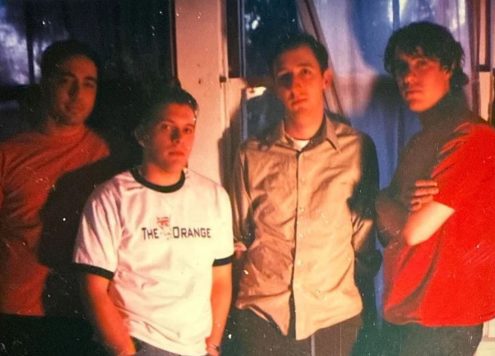Change is the only constant in life and few places does this old adage ring truer than with Brooklyn’s Oneida. After five years of recording and performing at The Ocropolis in Brooklyn, the building was closed in 2011 and scheduled for demolition. Build it up, knock it down.
Now, six years after the release of The Ocropolis’ last nurtured recordings, Oneida is back with Romance. Recorded over a number of years in a number of different locations, the songs remain distinctive to the band; surging and receding, angular and evolving. This is an album, thoughtfully sequenced and demanding of repeated listens.
Oneida played Romance‘s release show earlier this month, but the other tour dates have been postponed as drummer, Kid Millions recovers from a car crash. As one of his most recent tweets reminds us, “Wear your seatbelt, even in the back seat of a cab. It’s the only reason I’m still here.”
Ghettoblaster: It’s been six years since the last Oneida record though you’ve stayed busy with solo projects. Do these projects bleed into the new record or are they more chances to explore things outside the context of what you’d consider Oneida material?
Bobby Matador: I think we see everything as a continuum – solo and side projects are definitely distinct creative work, but music is wide work, and everything touches at the edges.
GB: The rhythms in Oneida songs always mesmerize me, the same in the Man Forever records. What inspiration do you draw from when making one for a song? Do they often come before the rest of the music?
BM: Every approach is a little different, but it’s water from the same well. Generalizing about process would negate the point of process in our music. There’s no one way that works for us.
GB: Recorded over a number of years at a number of locations, what unifies Romance?
BM: We pay attention to our instincts, and along the way our instincts made it clear that this work belongs together. I think the title sums it up – there are a lot of different sides to the concept of romance, which I think binds a lot of this together. I guess I would typically be more interested in what someone else’s experience tells them is the common vocabulary. It seems simultaneously obvious and ineffable to me.
GB: How much material didn’t make the new record? Do you think there will be a companion record taken from some of the same sessions?
BM: Well, we released a series of limited cassettes in the past few years called The Brah Tapes: 4 full-length releases that are part of the same family of recordings. That was a Brah Records joint, and highly limited on a non-digital format, so you’re forgiven for not having heard them! Next record will be new recordings/material. Already writing it.
GB: With the declining sales of albums in favor of streaming services shuffling through songs, does the changing ways of how people consume music affect your releases? Oneida has always been an album band in my mind, letting the record play all the way through.
BM: I think it’s fair to say that it affects how our releases are consumed and produced, but not how we envision the creation. For instance, the Brah Tapes coming out on cassette was a conscious choice, although we were lucky that at the time there was a revival of interest in that format. I like the idea that different formats prescribe different parameters that define how one has to consume the product.
GB: A lot of times the longer a band stays together and the older its members becomes their sound can mellow or maybe soften. I have always loved how Oneida seems to resist this by putting out consistently urgent and explorative music. Is there anything you’d attribute that to?
BM: If you look at the greatest of the great, that doesn’t necessarily happen, though. Miles Davis? James Brown? So I think I’d attribute it to the fact that we’re fucking great. I mean, people might not connect with our music personally or aesthetically, that’s fine and understandable. But you know, I think it’s pretty apparent that we’re not like most bands.
GB: Do you listen to your albums after you’ve finished recording them? Or is it more of a snapshot of where you were at that moment, lost in your personal progression?
BM: Me personally – I need a break. Maybe 4-5 years down the line I’ll listen back – and it always sounds so different with the passage of time.
GB: Where music is made can often inform the music itself, and Brooklyn is very volatile in its development, how do you think that’s affected the new material?
BM: Well, I guess maybe Oneida and Brooklyn share volatility, and constant change, and harsh beauty, and relentlessness. Those are constant factors, so I guess they must be continuing influences on new material. Watching Monster Island (home of the Ocropolis) reduced to rubble is a sobering reminder of perspective, which gives urgency to the act of looking for meaning, I suppose.
GB: Can Brooklyn and New York remain as an artistic and cultural incubator given the amount of development? Trying to set aside your personal connections and history, if you were starting over as a band, do you think you’d still choose to be based out of there?
BM: Hard to say what we’d do now; we’re a product of what’s already come. But one thing I know about predicting culture is that I seem to be pretty terrible at it. If Brooklyn stays a place where people can find each other and push each other to act on their ideas, then yeah. Will it stay that? I dunno. Seems hard, but it’s always been a pretty tough fucking town, right?
GB: You had a pretty long-standing relationship with the Secretly Canadian family, why the move to Joyful Noise for the new record?
BM: Jagjaguwar, our label for like 15 years, has grown to such extent that Oneida’s idiosyncratic approach and sound aren’t really a possibility for them to sell the way they’re currently set up as a business. Darus Van Arman wrote a thoughtful piece in Billboard a while back about those challenges; I recommend seeking it out for a good understanding of their situation. We parted ways amicably, with a lot of respect for each other. We are loving working with Joyful Noise so far, and they are living up to what we value in those we work with: honesty, thoughtful approach to creative community, and hard work.
GB: Is there any chance of Brah! Records reviving with more releases?
BM: Always! As noted above, the Brah Tapes kept the Brah family alive, and presumably something else perfect will pop up again…
Facebook | Instagram | Twitter










Social Media